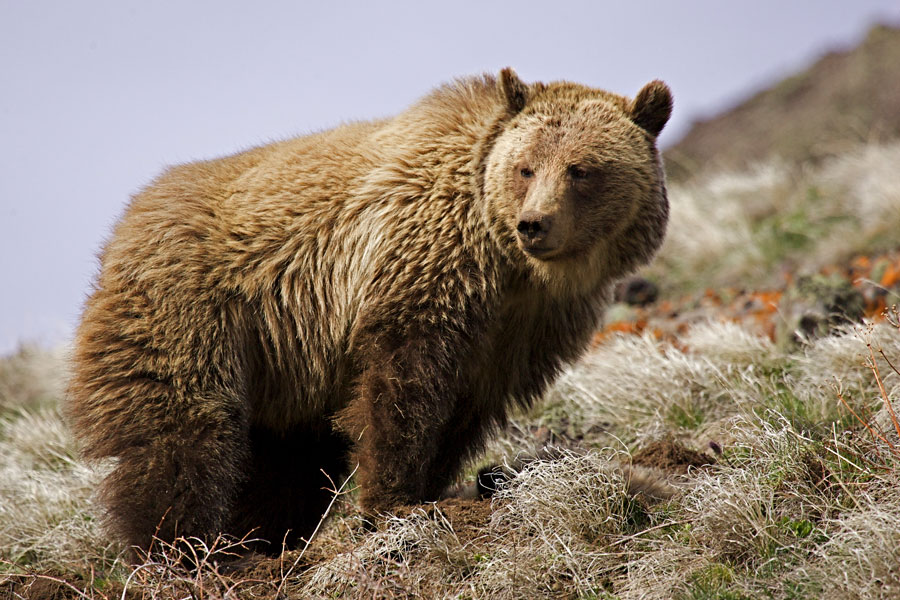The results of a new statewide survey reveal positive attitudes toward grizzly bears and support for their increasing presence on the Montana landscape, although that support diminishes in residential and agricultural areas as compared to remote public land areas, given the increased potential for conflict.
Researchers with the University of Montana worked alongside Montana Fish, Wildlife and Parks (FWP) biologists to better understand Montanans’ perspectives about grizzly bears and grizzly bear management in Montana. A survey questionnaire was mailed to 5,350 households randomly selected from across Montana, and 1,783 adults responded between November 2019 and January 2020. The survey’s confidence interval is plus or minus 3.5%. A summary of the results and the full survey is available to read online.
Overall, the survey results demonstrate the complex nature of grizzly bear–human relationships in Montana. FWP will use the results from the study along with other public input to help inform grizzly bear management planning and decision-making processes going forward.
“This new survey involved a collaborative effort between FWP and the University of Montana to better understand the challenges and values associated with grizzly bears in Montana,” according to FWP Director Martha Williams. “As a state, it’s important for us to recognize and respect these various perspectives so that we can work together to find common ground that benefits people and grizzly bears.”
Dr. Alex Metcalf, assistant professor in UM’s College of Forestry and Conservation, helped lead the survey design and analysis, and emphasized how the results can help inform grizzly bear management decisions once delisting cedes management authority to the state.
“As grizzly bear populations continue to expand across the state, Montanans will face choices about how to manage the overall population as well as individual animals,” Metcalf said. “So, at this important point in time for both bears and people, we’re excited to help inform these choices with hard numbers on residents’ attitudes, beliefs, and preferences toward grizzlies and their management.”
Trust in FWP to manage grizzly bears is relatively high, according to the survey, but Montanans’ report diverse views regarding the success of grizzly bear management and their satisfaction with that management in the state.
Most Montanans agree or strongly agree (92%) that grizzly bears have a right to exist in Montana, and 86% find it acceptable for bears to live in primarily forested areas that are publicly owned. When asked if grizzly bears do not belong where people live, the responses are more evenly divided: 35% agreed or strongly agreed, and 43% disagreed or strongly disagreed with this statement.
Fifty-seven percent disagree or strongly disagree that grizzly bears limit their recreational opportunities, while 23% agree or strongly agree with that statement.
When asked about their emotional response to seeing a grizzly bear from a distance while walking, more Montanans report they would be nervous, scared and upset than those who report they would be relaxed, not scared and pleased.
Nineteen percent of Montanans agree or strongly agree that their personal safety is threatened by grizzly bears, while 28% believe grizzly bears pose a safety risk to people they care about.
Still, 60% agree or strongly agree that people should learn to live with grizzly bears near their homes, whereas 20% disagree or strongly disagree with that notion.
When asked about taking actions to reduce grizzly bear-human conflict on their own property, willingness was high for securing attractants but lower for actions related to livestock.
Almost all Montanans (94%) report they have or would be willing to carry bear spray while recreating or hunting. Forty-nine percent support enough hunting to manage grizzly bear population size; 30% support a very limited season that does not affect the grizzly bear population size; and 4% support as much grizzly bear hunting as possible. Seventeen percent believe grizzly bears should never be hunted in Montana.
The publication of these survey results follows the conclusion of a separate year-long effort involving the Governor’s Grizzly Bear Advisory Council. The council, which featured 18 citizens from across the state, completed a report of recommendations and input on the future of grizzly bear management and conservation in Montana last month. The council’s report, this survey and other public input will continue to inform grizzly bear management in Montana.
“We are continuing, along with the University of Montana, to analyze the survey data to understand what the drivers of people’s attitudes towards bears are, as well as examine the differences between people who are already accustomed to living with grizzly bears versus those who aren’t,” said FWP Research Biologist Cecily Costello, who presented the results as part of the Interagency Grizzly Bear Committee’s end-of-year meeting.
